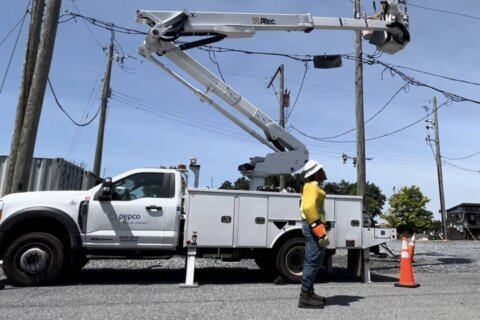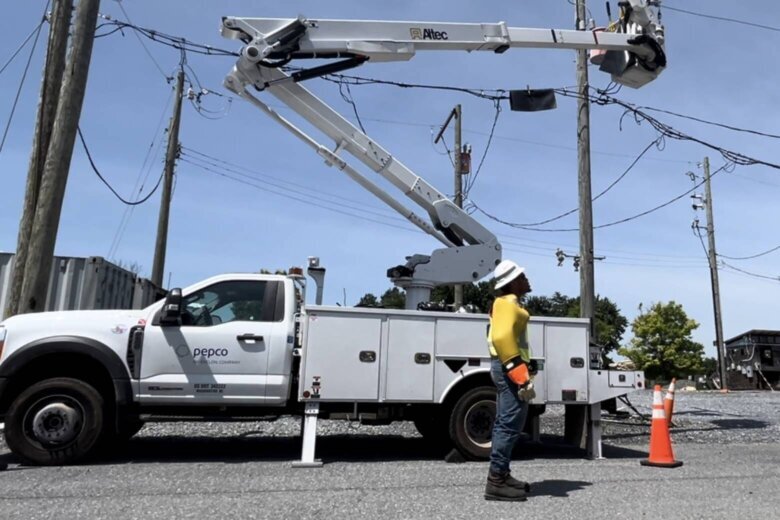
Some of Maryland’s largest utilities have hiked their rates by multiples of two or three since 2010, far outpacing the rate of inflation, according to a new report.
The Office of the People’s Counsel, which acts as a utility watchdog group in the state, said customers served by subsidiaries of Exelon Corporation — such as Baltimore Gas and Electric, Pepco and Delmarva Power — have been hit the hardest. The OPC is highlighting the hikes in bills as it calls for something to be done about them.
There are a number of factors that go into the final cost of your electric bill, but the part the utility controls is referred to as the “delivery rate,” Maryland People’s Counsel David Lapp said.
According to his office, BGE’s delivery rates have more than tripled over the past 14 years, while fellow Exelon subsidiaries Pepco and Delmarva Power have more than doubled their electric distributions rates over the same period.
“Customers of most of Maryland’s largest utilities are facing staggering levels of cost increases for the delivery of their electricity and gas,” Lapp said in a press release. “These increases reflect a concerted utility effort to boost profits by accelerating capital infrastructure spending — including massive spending on gas infrastructure that is at odds with State efforts to fight climate change.”
Lapp’s office found that increases were not so drastic across all Maryland utilities. First Energy subsidiary Potomac Edison’s rates have largely tracked inflation, rising from 1.7 cents per kilowatt-hour (kWh) to 2.2 cents per kWh. Pepco’s rates have increased by more than 3.5 cents over the same period.
In a statement to WTOP, Pepco said any changes to its distribution rates must be approved by the Maryland Public Service Commission. The utility company also said that it helped more than 35,000 customers receive more than $45.5 million in energy assistance.
“Our customers are becoming more reliant on safe and reliable energy to power their lives and livelihoods while we are also facing increased threats to the resiliency of our infrastructure, including cyber intrusions and more frequent severe weather brought by climate change,” the statement read. “The energy infrastructure investments we make now will ensure we can continue to meet our customers’ needs and support the pathway to achieve the State of Maryland’s goal to reach net zero emissions by 2045.”
Gas utility disparities
The report found a similar disparity with gas utilities.
Washington Gas, Maryland’s second largest gas provider behind BGE, has hiked its delivery rate at a much slower pace than BGE, the Office of the People’s Counsel found. Currently, Washington Gas rates are about half of the price of BGE’s rates.
“I think what our report does is raises serious question about why rates would increase so dramatically in one utility service territory versus another,” Lapp told WTOP. “Baltimore Gas and Washington Gas do have different service territories, but they’re probably not that different, where you have one company’s rates triple over a period of time where another company’s rates just go up at the rate of inflation.”.
Other than Exelon’s subsidiaries, Columbia Gas — Maryland’s third-largest gas utility — had the highest hike in delivery rates, with costs shooting up from 30 cents per therm — the amount of gas used — in 2010 to $1 per therm this year.
According to Lapp, the rapidly increasing delivery rates are tied to significant increases in utility spending on capital infrastructure, such as sub-stations, poles and wires for electric companies and pipes for gas utilities. Lapp’s office said utility companies can recover profits on that spending, but state policy has allowed for an accelerated recovery of those profits, further hurting utility customers.
“We would not dispute that they do need to do some repairs and put in new equipment. The rate at which they do that and the timing of that needs to be consistent with customer interest,” Lapp said. “We need to have effective state regulation of utilities. We need to recognize that they are private companies with investors to please and that requires effective regulation. And that regulation comes from the Maryland Public Service Commission, as well as the state legislature.”
WTOP’s Mike Murillo contributed to this report.
Get breaking news and daily headlines delivered to your email inbox by signing up here.
© 2024 WTOP. All Rights Reserved. This website is not intended for users located within the European Economic Area.









